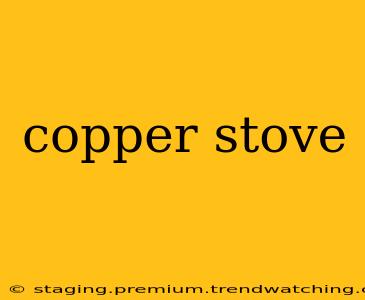Copper cookware has long been prized for its beauty and exceptional heat conductivity, making copper stoves a truly unique and desirable cooking experience. While less common than electric or gas stoves, copper stoves offer a distinct advantage for serious cooks and those who appreciate handcrafted, heirloom-quality appliances. This guide explores the world of copper stoves, answering common questions and highlighting their benefits and drawbacks.
What are the advantages of a copper stove?
Copper's superior heat conductivity is the primary advantage. It heats up quickly and evenly, allowing for precise temperature control and consistent cooking results. This is especially beneficial for delicate sauces and dishes requiring careful temperature management. Furthermore, the even heating prevents hot spots, leading to more consistent cooking across the entire cooking surface. Finally, many find the aesthetic appeal of a copper stove to be a significant plus, adding a touch of elegance and sophistication to any kitchen.
Are copper stoves expensive?
Yes, copper stoves are generally more expensive than stoves made from other materials like stainless steel or cast iron. The cost is largely due to the high cost of copper itself, as well as the skilled craftsmanship often involved in their creation. However, many consider the investment worthwhile due to the longevity and superior cooking performance of a copper stove. Think of it as an investment piece, similar to a high-quality set of copper cookware.
How do you clean a copper stove?
Cleaning a copper stove requires careful attention to avoid damaging the delicate surface. Generally, a soft cloth and mild detergent are sufficient for regular cleaning. Avoid abrasive cleaners or scouring pads, as these can scratch the copper. For stubborn stains, a specialized copper cleaner can be used, but always follow the manufacturer's instructions carefully. Regular polishing will help maintain the shine and luster of your copper stove.
What are the disadvantages of a copper stove?
While copper stoves offer many benefits, there are some drawbacks to consider. Copper is a relatively soft metal, making it susceptible to dents and scratches. It also requires more diligent cleaning to maintain its appearance. Furthermore, the cost is a significant factor for many potential buyers. Finally, finding a copper stove might require more searching than finding more common stove types.
How do copper stoves compare to other stove types?
Compared to electric stoves, copper stoves offer superior heat conductivity and control. Compared to gas stoves, copper stoves provide more even heat distribution, minimizing hot spots. Compared to induction stoves, copper stoves might not be as energy-efficient, though the precise comparison depends on the specific models being compared. Ultimately, the best stove type depends on individual needs and preferences.
Is a copper stove worth the price?
Whether a copper stove is "worth the price" is subjective and depends on individual priorities. If you are a serious cook who values superior heat control, even cooking, and the aesthetic appeal of copper, then the investment may well be worthwhile. However, if budget is a major concern, or if you prioritize other features over heat conductivity, then a less expensive stove might be a better option.
Where can I buy a copper stove?
Finding a copper stove might require some research. They are less common than other stove types, so you might need to check specialty kitchen stores, antique shops, or online marketplaces. You may also need to consider custom-made options from skilled metalworkers.
This guide provides a comprehensive overview of copper stoves. Remember to carefully weigh the advantages and disadvantages before making a purchase. The investment in a copper stove represents a commitment to quality, beauty, and a truly exceptional cooking experience.

